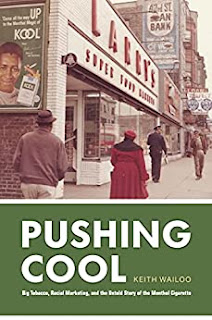Stephanie Jane recenzis Pushing Cool de Keith Wailoo
Scholarly, but very interesting
4 steloj
As is probably to be expected from a university press publication, Pushing Cool is quite a scholarly work, but I still found its story to be a compelling read. Apparently the book has grown out of a course that Keith Wailoo has taught for the past decade - Race, Drugs, and Drug Policy in America - and I can imagine that it makes for lots of passionate and in depth discussions. An isolated disappointment I have myself at the end of reading is that I'm now bursting with indignation and incredulity and don't know anyone else personally who has read Pushing Cool that I could talk over the book with.
The targeting shenanigans pulled by tobacco companies for decades are a clear cut example of systemic racism especially when viewed in tandem with the series of laws passed to stymie tobacco's marketing efforts. It could almost seem as though successive …
As is probably to be expected from a university press publication, Pushing Cool is quite a scholarly work, but I still found its story to be a compelling read. Apparently the book has grown out of a course that Keith Wailoo has taught for the past decade - Race, Drugs, and Drug Policy in America - and I can imagine that it makes for lots of passionate and in depth discussions. An isolated disappointment I have myself at the end of reading is that I'm now bursting with indignation and incredulity and don't know anyone else personally who has read Pushing Cool that I could talk over the book with.
The targeting shenanigans pulled by tobacco companies for decades are a clear cut example of systemic racism especially when viewed in tandem with the series of laws passed to stymie tobacco's marketing efforts. It could almost seem as though successive regulators funnelled tobacco towards inner city communities to spare their suburban counterparts. I was also intrigued by the self perpetuating way in which racial stereotypes which were initially created for and propagated by cigarette advertising were then internalised by audiences, later being recycled as learned truths with no remembrance of their origins. In a political context this would be pure propaganda and I found it very disconcerting to read about, wondering how many of what I think of as my own impressions have also been developed and distorted in such a way.
Wailoo has undertaken an impressively detailed survey of his subject, exploring and explaining his findings with a clarity that I appreciated. As an ex-smoker myself, albeit rarely of menthol cigarettes, I recognised my own 'safer smoking' journey to longer cigarettes and then through various lighter brands before eventually managing to quit, but I hadn't realised how many years earlier the significant findings about health damage had been made. That so many significant civil leaders were prepared to stand up in defence of tobacco at the expense of their community's health seems incredible to me now yet, as Wailoo eloquently explains, money talks and the trade-offs from large tobacco company payments did also benefit the same communities. A devil's bargain.
I did sometimes find Pushing Cool to be too repetitive for my tastes. I understand why Wailoo would feel the need to recap important points, but at times this seemed overdone to the point of padding out. However this might not be so obvious to someone reading the book over a longer period of time when the information refreshers could be more welcome. Overall, I very much enjoyed reading Pushing Cool and feel I learned a lot about this grim and secretive aspect of American history.

